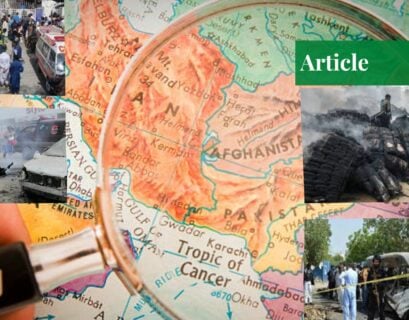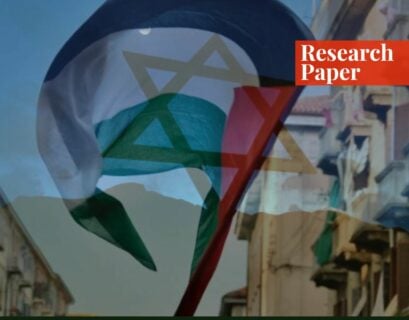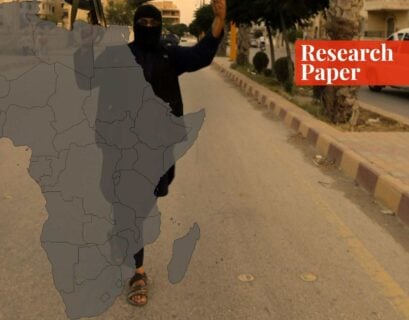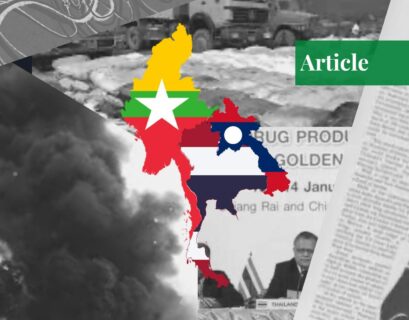Mr Abdullah Hafeez is a student of International Relations at Quaid-e-Azam University, Islamabad.
Due to the imposition of Western sanctions on Iran and a drive for self-sufficiency, Hezbollah has turned toward drug trafficking to fund both its terrorist activities and social services for its supporters. Taking advantage of the political and economic turmoil in Lebanon, the terrorist organization has secured a key position in the country.
It has been actively involved in taking up arms against Israel along the southern border. Historically, Iran has been a primary financial supporter of this group. This shift has expanded the Hezbollah drug trafficking circles and their subsequent influence from Latin America to Europe, Africa, and the Middle East.
Through its networking and massive reach, the organization has given rise to serious security and humanitarian issues, necessitating immediate action from leading world powers.
These Hezbollah operatives are overseeing all the illicit finance and the drug trafficking not just in Europe, but in South America, the Tri-Border region, moving about $200 a month
U.S Drug Enforcement Administration
Origin of Hezbollah
Formed during Lebanon’s 15-year-long civil war, Hezbollah (Party of God), is famous as a “State within a State”. It has been labeled a terrorist organization because of its status as a non-state actor targeting non-combatants using unconventional warfare.
Motivated by the Iranian revolution in 1979, they are Shiite Muslims working against the brutality of Israel and hate the ever-expanding Western Influence on the world.. Ranging from the attack on French and U.S. forces in 1983, killing 299 peacekeeping soldiers to the AMIA bombing of 1994 targeting the Jewish community of Argentina, they are involved in transnational and local attacks and are labeled as the first militia to start Kamikaze attacks on Middle Eastern soil. Under Hasan Nasrullah’s leadership, this group gained a more radicalized form.
Strengths
Internally more powerful than the official army of Lebanon, Hezbollah plays a significant role in institution building for the state by operating 4 hospitals, 12 clinics, 12 schools, and 2 agricultural centers aimed at providing technical assistance and training to the farmers. Additionally, it has an environmental department and various social assistance programs, showcasing its soft power and influence which further becomes a hindrance in the way of its complete eradication. To present their narrative and propaganda uninterrupted, Hezbollah operates a TV station named Al Manar.
Regarding the accumulated hard power, Hezbollah owned 12,000 rockets in 2006. According to the United States, it now possesses 1,50,000 missiles including a significant number of anti-tank, anti-ship, and anti-aircraft missiles. This has been wreaking havoc on the West’s radar as it poses a potentially serious threat with the capacity to hit Til Aviv (190 km from the Southern border), they have modern missiles like Zelzal-1, Zelzal-2, and Fateh-110 having a range of 210km, 300km, and 550km respectively. The value addition of GPS technology from Iran adds fuel to the fire by converting these lethal weapons into precision-guided versions.
Operating under the name of Islamic Jihad Organization (IJO) or Unit 910, Hezbollah’s military wing contains 45,000 fighters; half of them work on a full-time basis, and 5000-8000 operate in Syria, while the rest of them are in reserve.
Narco-Terrorism
Drug trafficking, which generates millions of dollars annually, is an attractive funding source for many terrorist organizations, and Hezbollah is no exception. The U.S. Counter-terrorism Department has primarily listed Hamas, Hezbollah, PKK, and Iran-based groups for involvement in narco-terrorism activities.
In the 1980s, Captagon, a substance known for making users emphatic and energetic, was eradicated from the international market due to its addictiveness (Captagon has re-emerged in Syria). Following this, Hezbollah began cultivating it in the Beeka Valley and affiliated areas, making it the world’s third-largest producer of cannabis resins. Over time, production escalated to tons, and illegal supply routes were established, reaching Latin America, the Tri-Bordered Area (TBA), and Europe.
Threat Perception
According to the United Nations, teenagers are the highest consumers of drugs, impacting their mental abilities, causing difficulties in social interactions, fostering thoughts of suicide, and motivating them further towards illegal and immoral actions, including hooliganism and criminal activities. The situation becomes complex when terrorists engage in drug trafficking, as it not only serves as a source of funding for terrorism but also contributes to the growth of the informal economy. Some experts view this as a component of hybrid warfare, employing all available means to disrupt the enemy state and its components, be it the citizenry or the economy.
In the United States, for instance, 1.6 million civilians are arrested for the sale, manufacturing, or possession of illegal substances.
Furthermore, the Terrorist-Criminal Nexus, which focuses on training and utilizing local criminals in the illicit drug trade, has nearly doubled the crime rate in Latin American countries. Lastly, there is growing concern about the issue’s roots, given the near impossibility of inspecting thousands of massive cargo ships. Despite technological advancements, countries reportedly intercept only 10-11% of the total drug trade, raising serious security concerns.
Shipping Routes and Income
According to a U.S. report, Hezbollah reportedly generates an estimated billion dollars annually from the illicit drug trade. The specific trading routes remain undisclosed due to its collaborative nature with local drug cartels. However, various sources suggest that Hezbollah utilizes Syrian land to facilitate the trade of its products across Jordan and Iran, leading to further distribution.
The Atlantic and Mediterranean Sea drug smugglers are known to utilize private airplanes and speedboats.
Concerning Europe, their alleged shipping operations take an indirect route through Latin America. Contraband is often concealed in cargo ships carrying bananas or other perishable goods. The intricate web of routes and methods underscores the complexity of Hezbollah’s involvement in the illicit drug trade.
The Hezbollah Drug Trafficking Network
Mexico
Leveraging Iran’s networks, Hezbollah consistently generates millions of dollars annually, constituting its second-highest source of income in these regions. Mexico, already infamous for drug consumption and illegal exports to nearby countries, has become a significant operational ground for Hezbollah. The connection between Hezbollah and Drug Trafficking Organizations (DTOs), particularly with groups like “Los Zetas,” raises serious security concerns at both the national and international levels.
This network significantly impacts the United States by trafficking illicit substances to over 1,000 cities, including Cocaine, Methamphetamine, Cannabis, Amphetamine, and Captagon. As the largest consumer of these drugs, the U.S. faces heightened risks. Analysts attribute Hezbollah and Iran’s “Death to America” motivation to unconventional means, highlighting the alarming statistic of over 240,000 prisoners annually in the U.S. being involved in drug-related crimes. Disturbingly, government agencies, instead of combating drug cartels, are implicit in these criminal activities. The conviction of a former Mexican mayor with ties to Hezbollah, emphasized by the United States Court of Justice, underscores serious concerns.
Tri-Border Area
Commonly known as the Tri-Border Area (TBA), the region is demarcated by Argentina, Paraguay, and Brazil. According to Jane’s Intelligence Review on Janes.com, the socio-political conditions, ineffective governance, and corruption prevailing in this area create a conducive environment for drug trafficking, illegal immigration, and violence. These conditions particularly benefit terrorist organizations like Hezbollah.
The crackdown on the Mexican border by the U.S. government has led to an increase in drug-related activities in the Tri-Border Area. Drug cartels in this region utilize shipping containers, fast boats, and private aircraft for their operations. More importantly, they receive training from Hezbollah’s military wings, ensuring the security of their operations along the maritime routes. This collaboration further maximizes the challenges posed by the intersection of criminal activities and terrorism in the region.
Europe
Drug trafficking across Europe has become more appealing due to the higher per-kilo pricetag of cocaine as compared to the U.S. market, coupled with a three times lower rate of interception from customs officers, as per Interpol. Billions of dollars are expended annually to procure drugs from the black market. Delivered from Latin America, primarily in banana containers, the Antwerp port is a gateway to the European market. It is a crucial route utilized by Hezbollah, contributing significantly to its drug-fuelled economy.
Africa
A United Nations report indicates that Hezbollah makes a substantial profit from drug trafficking, with over 50 metric tons traded annually across African land. Local terrorist organizations, particularly in Somalia, provide support to Hezbollah’s operations in this illicit trade.
Middle East
The Middle East faces a dual-front problem, stemming from Afghanistan and Lebanon-based Hezbollah. The most commonly used drugs are Captagon pills, produced for 3-4 cents but sold at $25 per pill in Saudi Arabia. This lucrative market further contributes to Hezbollah’s financial gains from its involvement in drug trafficking
Combating “Cocaine Jihad”
Fighting organized crime and drug trafficking is a priority for the European Union, its member states, and its international partners.
European Commission
From Italian coast guards confiscating millions of drug pills to Saudi Arabia blocking trade with Lebanon, the global community is actively combating the cancer that is drug trafficking.
The effectiveness of Operation Titan, conducted by U.S. and Colombian authorities against “Cocaine Jihad,” is evident. In December 2022, the United States enacted a law targeting drug trafficking, aiming to provide support and intelligence information to affected countries.
The Financial Action Task Force (FATF) has identified banks involved in money laundering, which goes hand-in-hand with any sort of smuggling or illicit trade, aiding Lebanon’s government in taking timely actions against them.
Furthermore, Operation Spector, a multi-national effort spanning South America, Europe, and the U.S., resulted in numerous arrests, the identification and seizure of accounts, and the capture of over 600 kg of drugs. To counter Mexican drug cartels, the U.S. not only erected a border wall but also invested billions in assisting local security forces to combat drug trafficking effectively. The Gulf Information Centre to Combat Drugs (GIC-CICCD) remains actively engaged in disrupting communication links and intelligence-based operations against smugglers. These combined efforts showcase a global commitment to tackling the complex issue of drug trafficking from various angles.
Conclusion
Hezbollah stands out as one of the most dangerous terrorist organizations, funded significantly by drug trafficking. As highlighted by Louise I. Shelley, there is no doubt that transnational crimes are the defining issues of the 21st century. It is imperative to collaborate on matters of collective interest, with drug trafficking at the forefront, as the partnership between drug smuggling criminals and terrorists poses a growing threat to global security.
If you want to submit your articles, research papers, and book reviews, please check the Submissions page.
The views and opinions expressed in this article/paper are the author’s own and do not necessarily reflect the editorial position of Paradigm Shift.



















